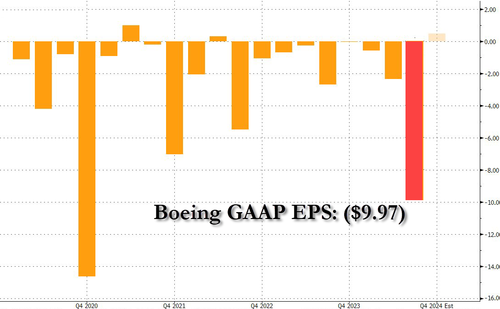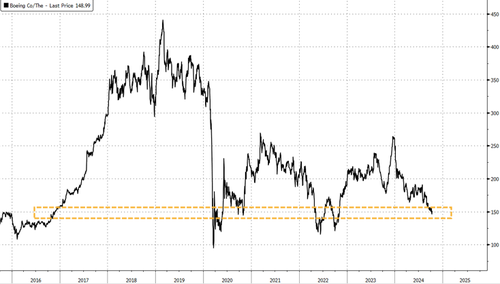Boeing Desperate For Liquidity, Files $25 Billion Shelf Registration
Just days after Boeing announced plans to cut 10% of its workforce due to intensifying financial pressure, such as dwindling cash reserves and mounting risk of a credit downgrade, as well as a drawn-out strike, the beleaguered planemaker filed a $25 billion shelf registration on Tuesday morning.
“This universal shelf registration provides flexibility for the company to seek a variety of capital options as needed to support the company’s balance sheet over a three-year period,” Boeing wrote in the filing.
Separately, Boeing entered into a $10 billion “supplemental credit agreement” with a consortium of lenders. It noted that the credit facility provides “additional short-term access to liquidity as we navigate through a challenging environment,” adding that it has not drawn down on this facility or its existing credit revolver.
Sources familiar with the situation told WSJ that Boeing is expected to pursue a stock offering of about $10 billion.
The company has not turned a profit since 2018 and has already burned through $1 billion in the monthlong strike. At the end of September, it had $10.3 billion in cash and securities, around the minimum amount needed to operate. It also has $45 billion in net debt.
The latest strike estimates from JPMorgan analysts indicate Boeing will lose $1.5 billion each month if workers stay off the production lines of commercial jets and continue picketing in the streets. Three major rating agencies have warned that the strikes could downgrade Boeing’s investment-grade credit rating to speculative territory, in other words, ‘junk.’
Last month, CFO Brian West told analysts at the Morgan Stanley conference that Boeing “will take any necessary actions” to preserve its investment grade rating and beef up its balance sheet.
“We are perfectly comfortable to supplement our liquidity position to support those two objectives,” West told investors when asked about future money raises.
Last week, Goldman analysts Noah Poponak and Anthony Valentini told clients:
“The company faces a balance sheet question, and has suggested raising capital is possible given the importance of the credit rating. We assume Boeing raises $12bn of equity before year-end, which matches the total maturities due in 2025 + 2026, and keeps the cash balance well north of $10bn in the near-to-medium-term while they ramp back up commercial deliveries and strive to resolve defense profitability.”
On Friday, the CEO penned a memo to employees about coming reductions of executives, managers, and employees (as much as 10% of its 171k workforce), warning that:
“Our business is in a difficult position, and it is hard to overstate the challenges we face together.”
According to preliminary figures, Boeing expects to report third-quarter revenue of $17.8 billion and a loss per share of $9.97.
Meanwhile, Boeing’s latest talks with its union to resolve 33,000 striking employees at its main Seattle-area facilities imploded early last week, prompting S&P Global Ratings to place the aircraft manufacturer on CreditWatch negative, with mounting risks that its investment-grade credit rating would be slashed to junk.
In markets, Boeing shares are up about 1% following the news of the shelf registration. On the year, shares are down 43%, trading around $148-$150 handle.
Dilution fears are here.
Tyler Durden
Tue, 10/15/2024 – 08:15
via ZeroHedge News https://ift.tt/jXd6QB5 Tyler Durden

